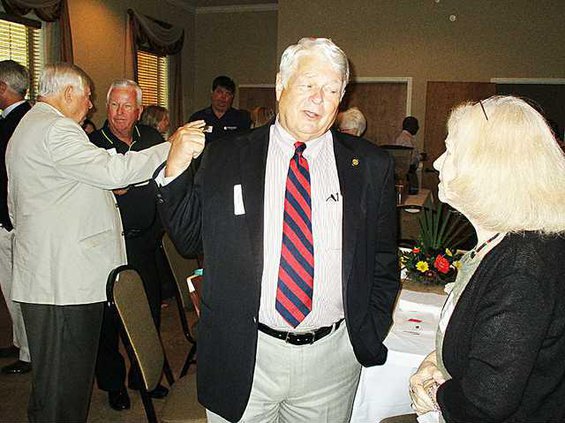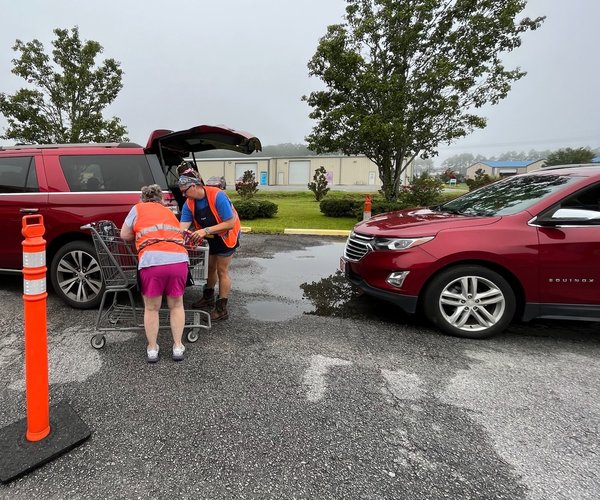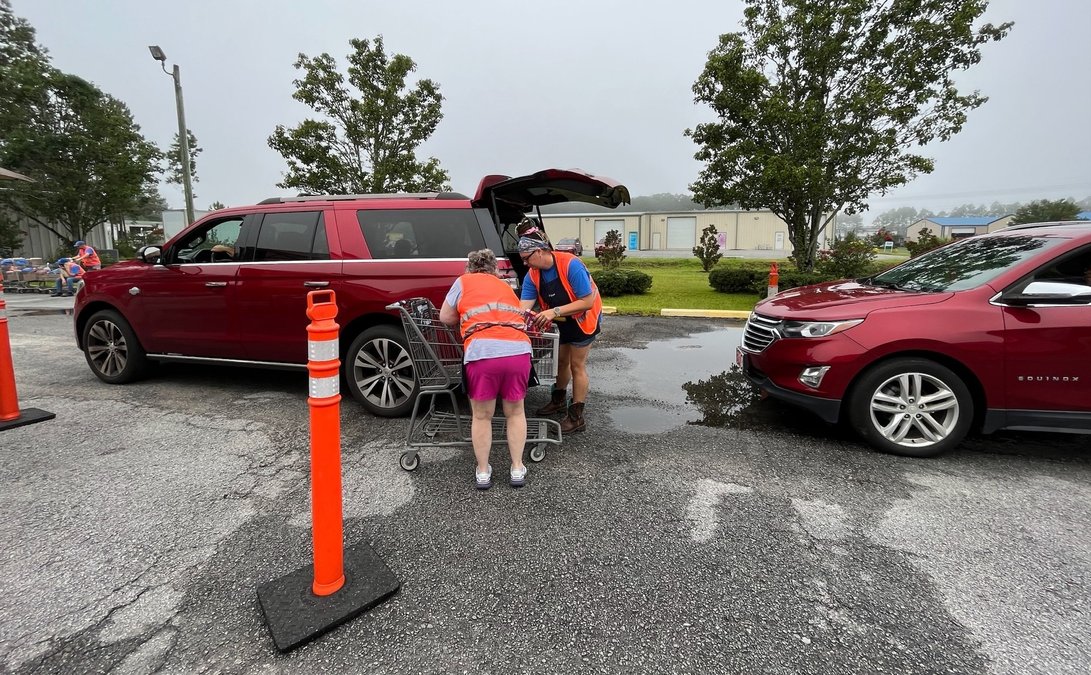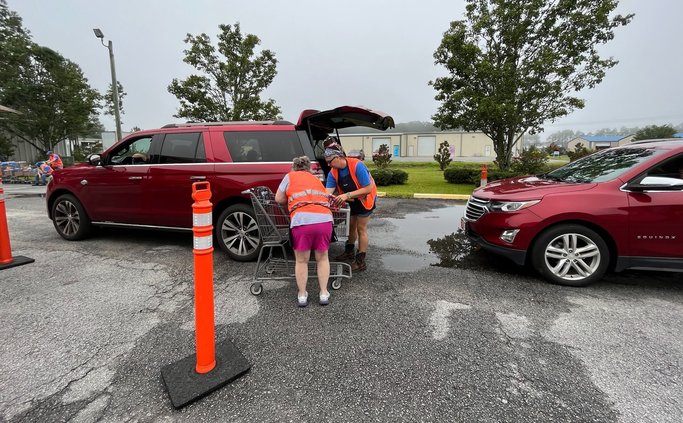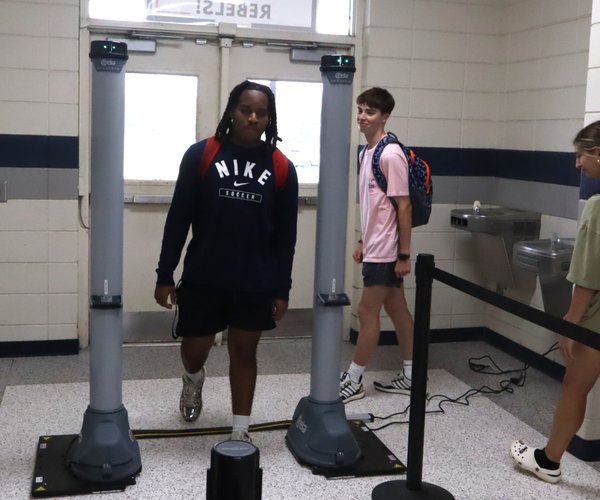While metro Atlanta still consumes a super-sized portion of Georgia’s highway funds, projects affecting Effingham County are getting a healthy serving of the increased revenue from the state’s new fuel tax system, Effingham Business Summit attendees heard last week.
About 80 people attended Thursday’s five-hour summit hosted by the Effingham County Chamber of Commerce at the New Ebenezer Retreat Center. Ongoing workforce education efforts and a desire for meeting spaces that can host larger events were also major topics.
But Rep. Bill Hitchens, R-Rincon, and Sen. Jack Hill, R-Reidsville, brought legislative updates, and Hitchens in particular talked about projects moving forward with the increased funding available under the Transportation Funding Act of 2015, also known as House Bill 170.
“Everybody in Effingham County knows transportation is a significant issue here, and we’re well set right now, I think, to try and deal with some of the issues, and you can see the construction going on all over the place,” Hitchens said.
Among other things, the area legislators this year secured $44 million in state funding for the Effingham Parkway. Effingham County Administrator Toss Allen cited a bid date of April 2019 for the parkway, planned to connect Blue Jay Road to Georgia Highway 30 near Benton Boulevard to help alleviate traffic on Georgia 21.
Once proposed as a four-lane parkway, it is now planned as two lanes. The projected cost is about $51 million to $52 million, with county officials hoping to obtain about $8 million from the next Special Purpose Local Option Sales Tax.
After Hitchens and Hill spoke in general terms in the morning, Allen and Georgia Department of Transportation District Engineer Brad Saxon, brought information on specific projects in the afternoon.
These included Saxon’s report that the redesigned Georgia 21 interchange on Interstate 16 may be ready for traffic in October and a longer-range projection for expansion of I-16 to three lanes in each direction between I-95 and Savannah.
‘Because there’s a need’
Hitchens noted that Effingham’s population grew from about 10,000 in 1970 to between 55,000 and 60,000 today. But its transportation system remained essentially the same, he said, with the widening of Highway 21 to four lanes the only significant expansion in decades.
He talked about his personal experience with the congestion that commuters face daily, and about how his drive home from the Savannah airport can take longer than the flight from Atlanta.
“You all know that we have worked diligently for I-95 and 21,” Hitchens said, “and I was told by the DOT that my district’s getting more transportation money this year and improvements than anywhere else in the state, and I don’t think it’s because of me. It’s because there’s a need. People are down here that have seen what goes on, the growth.”
Hitchens is a member of the House Transportation Committee, while Hill chairs the Senate Appropriations Committee. Hitchens brought greetings from the other member of Effingham’s delegation, Rep. John Burns, R-Newington, who as House majority leader was in Atlanta preparing for a Republican caucus that was held Friday.
Hill devoted his legislative update to the state’s rebound in revenue and predictions for 2017 legislative issues. But he touched on House Bill 170 when he noted that with the new fuel tax proceeds included, state revenue grew by nearly 10 percent in fiscal year 2016, which ended June 30. Not counting the fuel tax, revenue grew by more than 5 percent.
After Saxon talked about the Transportation Funding Act from the DOT’s perspective, summit organizers asked Hill back to the front to explain House Bill 170.
Its largest element was an overhaul of Georgia’s fuel tax system. Previously, the state collected a 4 cents per-dollar sales tax on motor fuels, but also a 7.5 cents per-gallon excise tax. The sales tax was eliminated and the whole amount, with an increase, converted to a per-gallon excise tax.
“It was a slight increase, based on the price of fuel at that time, somewhere around six cents, but the wonderful thing was, fuel prices because of the world oil market dropped precipitously almost immediately after we passed that bill,” Hill said. “We couldn’t have planned it better.”
By chance rather than planning, the small increase coincided with a drop in fuel prices of nearly $1 a gallon in 2015.
The bill also added highway use fees for owners of big trucks and electric cars and a $5 a night tax on hotel and motel stays.
As a result, the state has from $600 million to $800 million more a year more to spend on transportation projects.
‘Major mobility’ projects
Saxon, the Georgia Department of Transportation engineer, brought slides showing that the biggest boost has been in the department’s budget for capital projects. This leaped from about $275 million last fiscal year to $812 million for fiscal year 2017. Meanwhile, the department’s budget for routine maintenance work doubled, to about $400 million.
While the state government was enacting this boost to highway funding, the U.S. Congress also updated the Highway Trust Fund, which supplies federal money with a requirement that states put in a share.
From the two sources, Georgia will now have more than $2 billion a year for road and bridge maintenance and improvements, Saxon said.
He displayed a schematic map of Georgia’s Major Mobility Investment Program, which includes 11 projects to be built over 10 years at an estimated cost of $14 billion. Almost all of the projects are around Atlanta, connected to I-75, I-85, the I-285 perimeter or Georgia 400. But at the bottom of the chart, separate, were short lines representing I-16 and a bit of I-95.
“Right down there, this little add-on, that’s 16 and 95, involving I-16 into Savannah,” Saxon said, getting some laughs. “But guess what, that’s the best piece on there to me.”
Project timelines
The widening of I-16 to three lanes each way between I-95 and Savannah, and changes to the interchange to include flyover ramps, will probably go to construction in 2019, “which is pretty aggressive considering the magnitude of the work that has to be done,” he said.
Some more of Saxon’s updates:
-- Construction of the “diverging diamond” interchange at Georgia 21 and I-95 is continuing. Saxon predicted that “crossover day” will be in October, meaning traffic will be shifted to the new pattern then but some smaller parts of the project will remain to be completed.
-- Resurfacing of I-95 from just north of I-16 to South Carolina is set to go to contract in December for work to be underway next spring.
-- Construction of a roundabout for Georgia 17 at Georgia 119 will probably also begin in the spring, he said.
-- Preliminary engineering work has begun to replace what is locally known as the Steel Bridge, on Georgia 119 over the Ogeechee, as well as the overflow on the Bulloch County side. Saxon said construction is probably two and half years away.
The Department of Transportation has also increased its Local Maintenance and Improvement Grants for county and city projects. After incremental increases from $625,993 in 2014 to $634,643 in 2016, the amount granted Effingham County jumped to $836,465 for fiscal year 2017, Allen said.
Al Hackle may be reached at (912) 489-9458.

